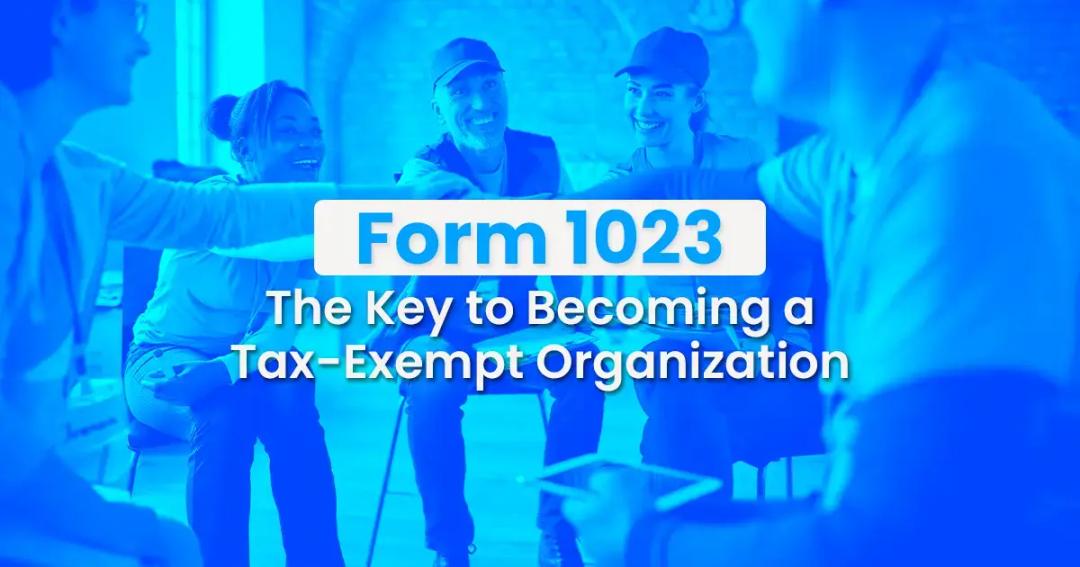
Understanding Form 1023 is a crucial for non-profits seeking tax-exempt status. It can be tricky to fill out accurately and ontime. When successfully filed and accepted, Form 1023 grants exemption from federal income tax, which is crucial for nonprofit organizations success. This blog simplifies Form 1023, clarifying eligibility and the filing process with step-by-step guidance. Continue reading to learn everything you need to know about Form 1023 for non-profits.
What Is Form 1023?
Form 1023 is a form used to request tax-exempt status for your organization. When filling out this form, you’re essentially explaining to the IRS your organization’s business plan and reasoning for seeking tax exemption.
Form 1023 qualifies organizations for federal tax exemption. If you live in a place where you pay state taxes, you need to register your organization with the state to obtain state tax exemption.
Boasting multiple pages and schedules, Form 1023 is a long, arduous document. If your organization is eligible, you may be able to file Form 1023-EZ, which is a much shorter and simpler version. This form is geared toward smaller non profit organizations.
Your organization may qualify for Form 1023-EZ if it meets the following requirements:
- Projected annual gross receipts do not exceed $50,000 in any of the next 3 years
- Actual annual gross receipts have not exceeded $50,000 in any of the past 3 years
- Total assets do not exceed $250,000
- The organization must not be a foreign organization, LLC, a successor to a for-profit entity, church, school, or hospital
- The organization must not request classification as a supporting organization or a private operating foundation
- The organization must not maintain or plan to maintain one or more donor-advised funds
Who Can File Form 1023?
There are numerous types of 501(c) organizations, the most common types of nonprofits. To be a 501(c)(3) organization, your nonprofit must:
- Be organized as a trust, an unincorporated association or a corporation
- Operate exclusively for a purpose established under section 501(c)(3), which includes charitable, scientific, educational, and religious purposes, among others
501(c)(3) organizations are prohibited from participating in political campaigns, unfairly dispersing the organization’s earnings among board members and managers, and engaging in opportunities unrelated to the organization’s mission statement.
Houses of worship, such as churches, synagogues, and mosques, are not technically required to file Form 1023, but it is recommended because it guarantees that the donations they receive are tax-deductible for donors.
How to Fill Out Form 1023
Before starting your Form 1023, make sure to look at the Form 1023 checklist to find out what information and materials you will need to successfully complete the form. Some of this information includes your Employer Identification Number (EIN) and articles of organization. If you need to file for your EIN, we can assist you with that.
Form 1023 sections explained:
- Part I – Identification information. Fill in your name, address, EIN, date of organization formation, etc.
- Part II – State your organization’s structure (trust, limited liability company, etc.)
- Part III – This section verifies if your organization meets the criteria of section 501(c)(3).
- Part IV – Describe your organization’s past, present, and future activities.
- Part V – This section is where you put information regarding compensation for employees, officers, directors, trustees, and independent contractors.
- Part VI – Write down groups and other organizations that benefit from your nonprofit.
- Part VII – This section asks if you are a successor to another organization and if you are submitting this form 27 months after your organization’s formation.
- Part VIII – This section asks about your organization’s activities including fundraising, political affiliations and relationships with other organizations.
- Part IX – Input financial data, investment income, and contributions and grants you received.
- Part X – Classify whether your organization is a public charity, private foundation, or private operating foundation.
- Part XI – User fee information. You will have to pay either $400 or $850. If your annual gross receipts exceed $10,000 over a four-year period, you will need to pay the $850 fee.
Depending on the type of organization you are operating, you will need to complete one or more of the following schedules:
- Schedule A – Churches.
- Schedule B – Schools, colleges, and universities.
- Schedule C – Hospitals and medical research organizations.
- Schedule D – Section 509(a)(3) supporting organizations.
- Schedule E – Organizations not filing Form 1023 within 27 months of formation.
- Schedule F – Homes for the elderly or handicapped and low-income housing.
- Schedule G – Successors to other organizations.
- Schedule H – Organizations providing scholarships, fellowships, educational loans or other education grants to individuals and private foundations requesting advance approval of individual grant procedures.
Work with the Experts
Working with 1-800Accountant can significantly streamline the process of filling out complex forms like IRS Form 1023. Our team of expert accountants offers a wealth of knowledge and experience in non-profit tax and financial matters, which helps to ensure accuracy and compliance.
We can handle complex tasks such as filing for your Employer Identification Number (EIN) or completing Form 1023, saving you time and effort. By entrusting your accounting and tax needs to 1-800Accountant, you free up more time to focus on your organization's mission.
You can also learn more about the unique and complicated landscape of non-profit taxes with this helpful guide.
This post is to be used for informational purposes only and does not constitute legal, business, or tax advice. Each person should consult his or her own attorney, business advisor, or tax advisor with respect to matters referenced in this post. 1-800Accountant assumes no liability for actions taken in reliance upon the information contained herein.
